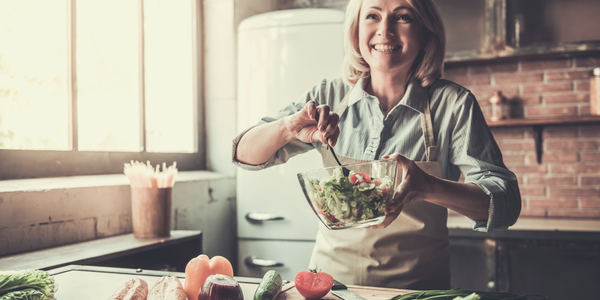
Cancer is a multifaceted disease with many complex risk factors. Some research suggests nutrition influences about 35 percent of cancer diagnoses. Consequently, diet is just one factor that can influence breast cancer risk.
While there is no single "breast cancer diet" that can ensure guaranteed protection or cure from this disease, some foods may be considered breast cancer-fighting foods because they have been shown to have cancer-fighting properties.
Cancer research continues to unfold the best foods for breast cancer. Read below for the latest truth about a breast cancer diet and which foods have breast cancer-fighting properties.
9 Risk Factors for Breast Cancer
As with all cancers, there are some risk factors for breast cancer that are beyond control such as genetic predisposition and a family history of breast cancer. However, the following are risk factors for breast cancer that are modifiable by lifestyle changes.
Post-Menopausal Weight Gain
Before menopause, the estrogen hormone primarily comes from the ovaries. However, after menopause, estrogen primarily comes from fat tissue, as ovaries drastically lower their production of estrogen.
Additionally, fat tissue is more likely to increase after menopause which can lead to higher levels of estrogen. This in turn can increase the risk for breast cancer.
High-Fat Diet
How a high-fat diet may increase the risk of developing breast cancer is not completely understood. Some studies have shown an association between high fat intake and breast cancer risk, and some studies have not. Different types of fat may have different effects on breast cancer risk.
Until more research determines specifics with fat intake and breast cancer risk, health experts suggest following a moderate fat intake that is from a variety of healthy fat sources including omega 3 fatty acids. Limit saturated fat intake to 10% of daily calories and eliminate trans fats.
Too Much Alcohol
Drinking alcohol more than the moderate recommendation can increase the risk for several diseases including breast cancer. Even moderate alcohol intake in women has been shown to have a small increase in breast cancer risk compared to women who drink no alcohol.
However, the greatest breast cancer risk is for women drinking more than 1 alcoholic drink per day.
Sedentary Lifestyle
Exercise, like with other diseases, can help lower the risk for breast cancer. How much and what type of exercise is needed to lower breast cancer risk is not clear, but any exercise may provide health benefits.
The American Cancer Society recommends adults get 150 to 300 minutes of moderate-intensity or 75 to 150 minutes of vigorous-intensity activity each week (or a combination). Of course, getting more than 300 minutes per week of exercise may provide additional health benefits.
Using Birth Control or Hormone Therapy
Breast cancer is a hormone-sensitive cancer. Therefore, anytime sex hormones, like estrogen or progesterone, are increased, there is potential for an increased breast cancer risk.
Similarly, not breastfeeding may also increase the risk for breast cancer, as breastfeeding can naturally help regulate sex hormones longer after giving birth.
Meat Cooked at High Temperatures
Meat cooked at high temperatures, or cooked well done, has been shown to increase the risk of breast cancer. Heterocyclic amines (HCAs) and polycyclic aromatic hydrocarbons (PAHs) are formed when meat is cooked at high temperatures, like pan-frying or grilling, and are considered to be mutagenic.
Overall, this means high temp meats have the capacity to cause damage to cell DNA that may increase the risk for cancer.
Low-Fiber Diet
Some, but not all, studies have shown a significant inverse association between dietary fiber intake and risk of breast cancer. A 2010 review on breast cancer and fiber concluded every 10 grams of fiber per day increment in dietary fiber intake was associated with a significant 7% reduction in breast cancer risk.
High Iron Intake (Postmenopause)
Women's iron needs naturally go down after menopause with a decrease in monthly blood loss. A high intake of iron in postmenopause women may increase the risk of damage to cell DNA, as high levels of iron can be considered pro-oxidant.
Because of this, high iron intake in post-menopause women may increase the risk for breast cancer.
Low Folate Intake
Folate is needed to make new DNA and RNA. Folate is found in leafy greens, legumes, oranges, cantaloupe, and grains.
Some studies have shown getting enough dietary folate may help lower breast cancer risk and low dietary folate may increase risk.
Breast Cancer Fighting Foods
While no single food or diet can completely protect against any chance of breast cancer, certain foods may be considered cancer-fighting foods. Such foods and eating patterns are a good source of antioxidants and compounds that may help protect against carcinogens.
Fruits and Vegetables
All fruits and vegetables provide many health benefits including being a source of antioxidants which may help protect cells from carcinogens. It is recommended to eat a variety of fruits and vegetables for the most health benefit. Breastcancer.org suggests aiming for 5 cups or more of fruits and vegetables per day.
Another way fruits and vegetables can be considered breast cancer-fighting foods is they are high in fiber and folate. As mentioned above, some studies have shown diets low in fiber and/or folate to be associated with a higher risk of breast cancer. Therefore, eating more fruits and vegetables can help ensure an adequate intake of folate and fiber.
Plant-Based Proteins
Besides meat cooked at high temperatures, red meat intake may be linked with breast and other types of cancer. Red meat is also a good source of iron. Therefore, cutting back on red meat and/or meat cooked at high temperatures, especially after menopause, can help lower the risk for breast cancer.
Plant-based proteins can be used in place of meats to cut down on these risks and provide lower amounts of fat and higher fiber. Examples of plant-based proteins include beans, tofu, tempeh, and nuts/seeds. Meal ideas for plant-based proteins include veggie burgers, vegetarian cauliflower tacos, or Indian chickpea chana masala.
This might beg the question, "Is soy good or bad for breast cancer?"
Soy has been associated as a potentially harmful food for breast cancer. This is because soy has a compound called phytoestrogen, which is a plant compound that can act similarly to estrogen once in the body. Remember, too much estrogen in the body may increase the risk for breast cancer.
However, research studies have not shown soy to be harmful. Soy foods do not increase breast cancer risk and may even help lower the risk of breast cancer returning in former survivors of breast cancer.
So, is soy healthy? Yes, soy foods such as tempeh, edamame, soy milk, tofu, or miso can be considered healthy and safe for breast cancer risk. In fact, soy foods are a good source of fiber, vitamins, and minerals besides being a plant protein!
Where some caution may be warranted with soy and breast cancer risk of soy supplements that are not whole foods.
Whole Grains
Like fruits and vegetables, whole grains are a good source of fiber, folate, and antioxidants making them a top breast cancer-fighting food. Examples of whole grains include whole-wheat bread, brown rice, oats, quinoa, couscous, farro, or whole wheat pasta.
Overall Balanced, Plant-Based Diet
What does increasing fruits, vegetables, whole grains, and plant proteins in the diet equal? The main components of a plant-based diet.
Following a plant-based diet can also help with weight regulation and maintaining a healthy weight, which can further benefit breast cancer risk. A plant-based diet can still include some meat and other animal-based foods, but the majority of foods are from plants.
If looking for a balanced, nutrient-dense diet plan you can trust, consider a food delivery program such as bistroMD. Doctor-designed and chef-prepared, rest easy knowing all meals are nutritious and tasty.
Breast Cancer Diet Recap
Risk factors for breast cancer can include weight gain after menopause, hormonal regulation with birth control or hormone replacement therapy, too much alcohol, a sedentary lifestyle, and various dietary factors. While nutrition can only account for partially impacting breast cancer risk, it is an important piece of prevention.
Following a diet that helps lower breast cancer risk includes following a plant-based diet that is rich in fruits, vegetables, whole grains, and plant-based proteins. This will also ensure a healthy diet that provides good sources of folate and fiber.
In addition to eating a diet made of breast cancer-fighting foods, limit alcohol intake and aim to be physically active to further lower risk.
References:
Diet tips to prevent breast cancer and keep it from coming back. WebMD. Published January 13, 2021.https://www.webmd.com/breast-cancer/ss/slideshow-diet-after-breast-cancer.
Kotepui M. Diet and risk of breast cancer. Contemp Oncol (Pozn). 2016;20(1):13-19. doi:10.5114/wo.2014.40560
Lifestyle-related breast cancer risk factors. American Cancer Society. Published June 9, 2020. https://www.cancer.org/cancer/breast-cancer/risk-and-prevention/lifestyle-related-breast-cancer-risk-factors.html.







